跨文化交际案例 英语专业
- 格式:doc
- 大小:26.00 KB
- 文档页数:5
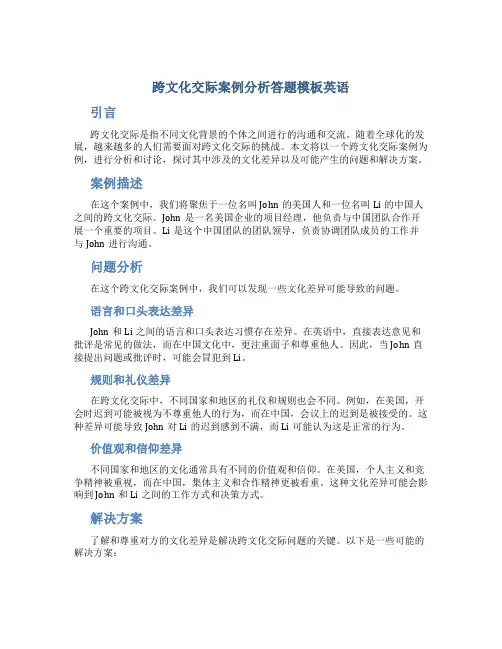
跨文化交际案例分析答题模板英语引言跨文化交际是指不同文化背景的个体之间进行的沟通和交流。
随着全球化的发展,越来越多的人们需要面对跨文化交际的挑战。
本文将以一个跨文化交际案例为例,进行分析和讨论,探讨其中涉及的文化差异以及可能产生的问题和解决方案。
案例描述在这个案例中,我们将聚焦于一位名叫John的美国人和一位名叫Li的中国人之间的跨文化交际。
John是一名美国企业的项目经理,他负责与中国团队合作开展一个重要的项目。
Li是这个中国团队的团队领导,负责协调团队成员的工作并与John进行沟通。
问题分析在这个跨文化交际案例中,我们可以发现一些文化差异可能导致的问题。
语言和口头表达差异John和Li之间的语言和口头表达习惯存在差异。
在英语中,直接表达意见和批评是常见的做法,而在中国文化中,更注重面子和尊重他人。
因此,当John直接提出问题或批评时,可能会冒犯到Li。
规则和礼仪差异在跨文化交际中,不同国家和地区的礼仪和规则也会不同。
例如,在美国,开会时迟到可能被视为不尊重他人的行为,而在中国,会议上的迟到是被接受的。
这种差异可能导致John对Li的迟到感到不满,而Li可能认为这是正常的行为。
价值观和信仰差异不同国家和地区的文化通常具有不同的价值观和信仰。
在美国,个人主义和竞争精神被重视,而在中国,集体主义和合作精神更被看重。
这种文化差异可能会影响到John和Li之间的工作方式和决策方式。
解决方案了解和尊重对方的文化差异是解决跨文化交际问题的关键。
以下是一些可能的解决方案:语言和口头表达差异的解决方案为了避免语言和口头表达差异导致的冲突,John和Li可以通过以下方式改善沟通:•John可以更加谨慎并尽量避免直接提出问题或批评。
他可以使用委婉的方式表达意见,以减少冲突的可能性。
•Li可以积极开放地接受和理解John的反馈,并了解到这是一种不同的口头表达习惯。
规则和礼仪差异的解决方案为了解决规则和礼仪差异可能带来的问题,John和Li可以尝试以下解决方案:•John可以提前向Li解释美国文化中的规则和礼仪,以便Li了解和适应这些差异。

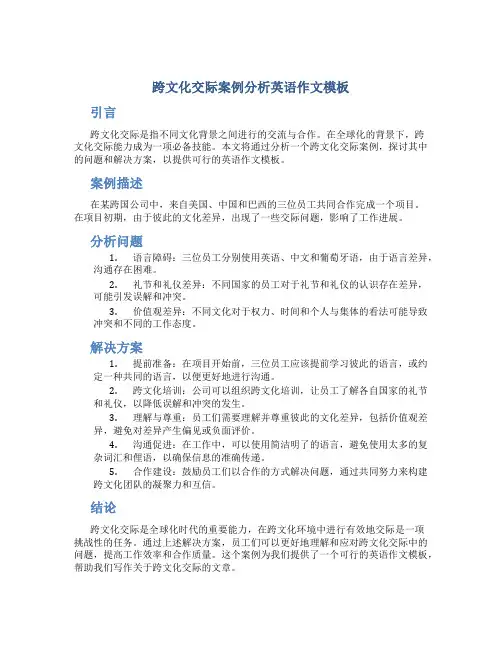
跨文化交际案例分析英语作文模板引言跨文化交际是指不同文化背景之间进行的交流与合作。
在全球化的背景下,跨文化交际能力成为一项必备技能。
本文将通过分析一个跨文化交际案例,探讨其中的问题和解决方案,以提供可行的英语作文模板。
案例描述在某跨国公司中,来自美国、中国和巴西的三位员工共同合作完成一个项目。
在项目初期,由于彼此的文化差异,出现了一些交际问题,影响了工作进展。
分析问题1.语言障碍:三位员工分别使用英语、中文和葡萄牙语,由于语言差异,沟通存在困难。
2.礼节和礼仪差异:不同国家的员工对于礼节和礼仪的认识存在差异,可能引发误解和冲突。
3.价值观差异:不同文化对于权力、时间和个人与集体的看法可能导致冲突和不同的工作态度。
解决方案1.提前准备:在项目开始前,三位员工应该提前学习彼此的语言,或约定一种共同的语言,以便更好地进行沟通。
2.跨文化培训:公司可以组织跨文化培训,让员工了解各自国家的礼节和礼仪,以降低误解和冲突的发生。
3.理解与尊重:员工们需要理解并尊重彼此的文化差异,包括价值观差异,避免对差异产生偏见或负面评价。
4.沟通促进:在工作中,可以使用简洁明了的语言,避免使用太多的复杂词汇和俚语,以确保信息的准确传递。
5.合作建设:鼓励员工们以合作的方式解决问题,通过共同努力来构建跨文化团队的凝聚力和互信。
结论跨文化交际是全球化时代的重要能力,在跨文化环境中进行有效地交际是一项挑战性的任务。
通过上述解决方案,员工们可以更好地理解和应对跨文化交际中的问题,提高工作效率和合作质量。
这个案例为我们提供了一个可行的英语作文模板,帮助我们写作关于跨文化交际的文章。
参考文献无。
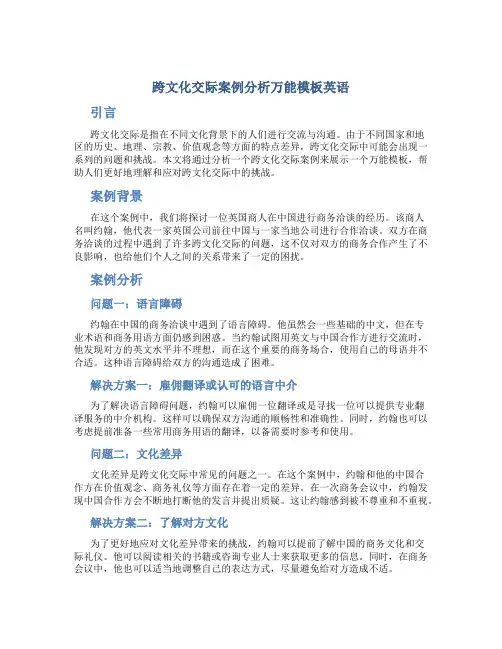
跨文化交际案例分析万能模板英语引言跨文化交际是指在不同文化背景下的人们进行交流与沟通。
由于不同国家和地区的历史、地理、宗教、价值观念等方面的特点差异,跨文化交际中可能会出现一系列的问题和挑战。
本文将通过分析一个跨文化交际案例来展示一个万能模板,帮助人们更好地理解和应对跨文化交际中的挑战。
案例背景在这个案例中,我们将探讨一位英国商人在中国进行商务洽谈的经历。
该商人名叫约翰,他代表一家英国公司前往中国与一家当地公司进行合作洽谈。
双方在商务洽谈的过程中遇到了许多跨文化交际的问题,这不仅对双方的商务合作产生了不良影响,也给他们个人之间的关系带来了一定的困扰。
案例分析问题一:语言障碍约翰在中国的商务洽谈中遇到了语言障碍。
他虽然会一些基础的中文,但在专业术语和商务用语方面仍感到困惑。
当约翰试图用英文与中国合作方进行交流时,他发现对方的英文水平并不理想,而在这个重要的商务场合,使用自己的母语并不合适。
这种语言障碍给双方的沟通造成了困难。
解决方案一:雇佣翻译或认可的语言中介为了解决语言障碍问题,约翰可以雇佣一位翻译或是寻找一位可以提供专业翻译服务的中介机构。
这样可以确保双方沟通的顺畅性和准确性。
同时,约翰也可以考虑提前准备一些常用商务用语的翻译,以备需要时参考和使用。
问题二:文化差异文化差异是跨文化交际中常见的问题之一。
在这个案例中,约翰和他的中国合作方在价值观念、商务礼仪等方面存在着一定的差异。
在一次商务会议中,约翰发现中国合作方会不断地打断他的发言并提出质疑。
这让约翰感到被不尊重和不重视。
解决方案二:了解对方文化为了更好地应对文化差异带来的挑战,约翰可以提前了解中国的商务文化和交际礼仪。
他可以阅读相关的书籍或咨询专业人士来获取更多的信息。
同时,在商务会议中,他也可以适当地调整自己的表达方式,尽量避免给对方造成不适。
问题三:时间观念中国和英国在时间观念方面存在差异。
在这个案例中,约翰和他的中国合作方在商务洽谈的时间上产生了矛盾。
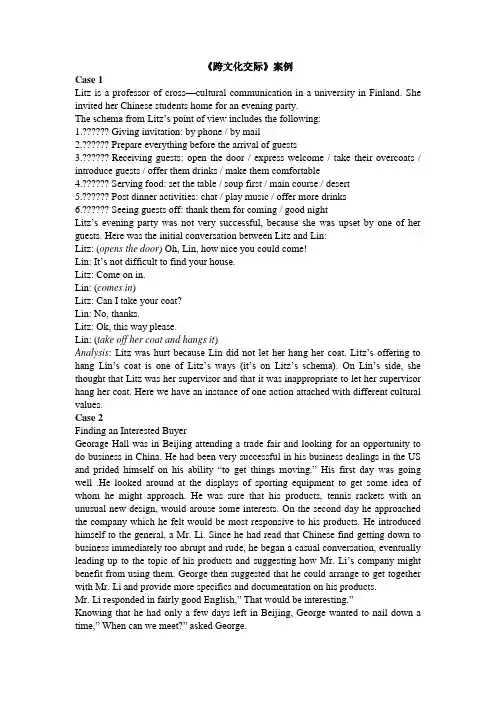
《跨文化交际》案例Case 1Litz is a professor of cross—cultural communication in a university in Finland. She invited her Chinese students home for an evening party.The schema from Litz’s point of view includes the following:1.?????? Giving invitation: by phone / by mail2.?????? Prepare everything before the arrival of guests3.?????? Receiving guests: open the door / express welcome / take their overcoats / introduce guests / offer them drinks / make them comfortable4.?????? Serving food: set the table / soup first / main course / desert5.?????? Post dinner activities: chat / play music / offer more drinks6.?????? Seeing guests off: thank them for coming / good nightLitz’s evening party was not very successful, because she was upset by one of her guests. Here was the initial conversation between Litz and Lin:Litz: (opens the door) Oh, Lin, how nice you could come!Lin: It’s not difficult to find your house.Litz: Come on in.Lin: (comes in)Litz: Can I take your coat?Lin: No, thanks.Litz: Ok, this way please.Lin: (take off her coat and hangs it)Analysis: Litz was hurt because Lin did not let her hang her coat. Litz’s offering to hang Lin’s coat is one of Litz’s ways (it’s on Litz’s schema). On Lin’s side, she thought that Litz was her supervisor and that it was inappropriate to let her supervisor hang her coat. Here we have an instance of one action attached with different cultural values.Case 2Finding an Interested BuyerGeorage Hall was in Beijing attending a trade fair and looking for an opportunity to do business in China. He had been very successful in his business dealings in the US and prided himself on his ability “to get things moving.” His first day was going well .He looked around at the displays of sporting equipment to get some idea of whom he might approach. He was sure that his products, tennis rackets with an unusual new design, would arouse some interests. On the second day he approached the company which he felt would be most responsive to his products. He introduced himself to the general, a Mr. Li. Since he had read that Chinese find getting down to business immediately too abrupt and rude, he began a casual conversation, eventually leading up to the topic of his products and sugges ting how Mr. Li’s company might benefit from using them. George then suggested that he could arrange to get together with Mr. Li and provide more specifics and documentation on his products.Mr. Li responded in fairly good English,” That would be interesting.”Knowing that he had only a few days left in Beijing, George wanted to nail down a time,” When can we meet?” asked George.“Ah. This week is very busy,” replied Mr. Li.“It sure is,” said George,” How about 10 o’clock? Meet you here.”“Tomorrow at 10 o’clock?” asked Mr. Li thoughtfully.“Right,” said George, “I’ll see you then?”“Hmm, yes; why don’t you come by tomorrow,” was the reply.“OK,” responded George,” It was nice meeting you.”The next day at 10 o’clock he approached Mr. Li’s company’s exhibit only to find that Mr. Li had some important business and was not able to meet with George. He called back later in the day and was told that Mr. Li was not available.Analysis: 英美人士做事情讲究守时。
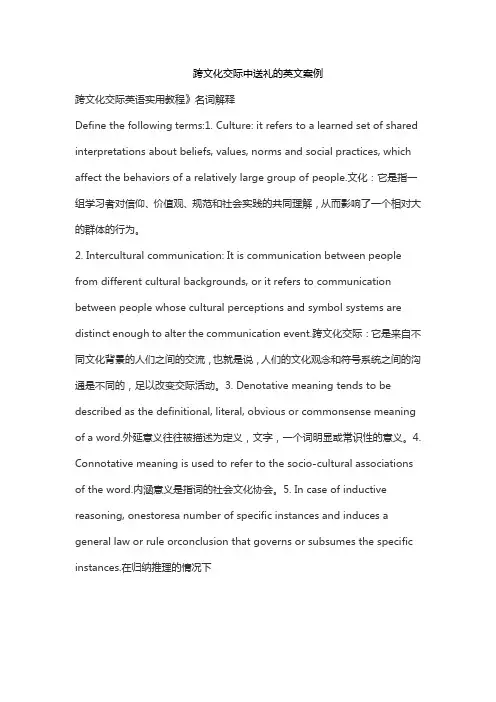
跨文化交际中送礼的英文案例跨文化交际英语实用教程》名词解释Define the following terms:1. Culture: it refers to a learned set of shared interpretations about beliefs, values, norms and social practices, which affect the behaviors of a relatively large group of people.文化:它是指一组学习者对信仰、价值观、规范和社会实践的共同理解,从而影响了一个相对大的群体的行为。
2. Intercultural communication: It is communication between people from different cultural backgrounds, or it refers to communication between people whose cultural perceptions and symbol systems are distinct enough to alter the communication event.跨文化交际:它是来自不同文化背景的人们之间的交流,也就是说,人们的文化观念和符号系统之间的沟通是不同的,足以改变交际活动。
3. Denotative meaning tends to be described as the definitional, literal, obvious or commonsense meaning of a word.外延意义往往被描述为定义,文字,一个词明显或常识性的意义。
4. Connotative meaning is used to refer to the socio-cultural associations of the word.内涵意义是指词的社会文化协会。
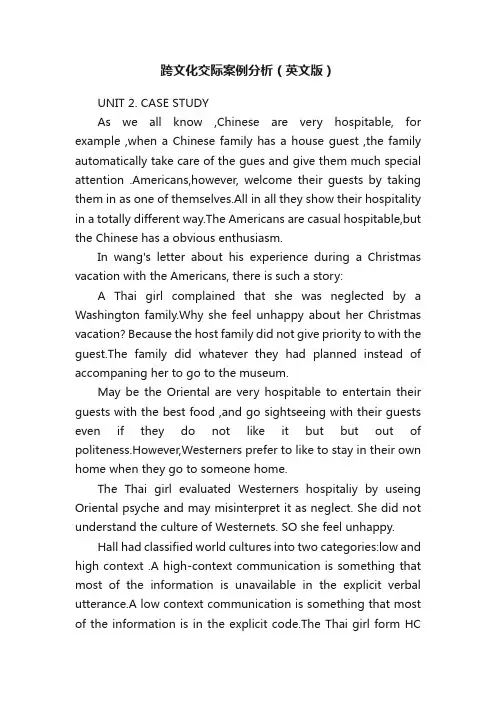
跨文化交际案例分析(英文版)UNIT 2. CASE STUDYAs we all know ,Chinese are very hospitable, for example ,when a Chinese family has a house guest ,the family automatically take care of the gues and give them much special attention .Americans,however, welcome their guests by taking them in as one of themselves.All in all they show their hospitality in a totally different way.The Americans are casual hospitable,but the Chinese has a obvious enthusiasm.In wang's letter about his experience during a Christmas vacation with the Americans, there is such a story:A Thai girl complained that she was neglected by a Washington family.Why she feel unhappy about her Christmas vacation? Because the host family did not give priority to with the guest.The family did whatever they had planned instead of accompaning her to go to the museum.May be the Oriental are very hospitable to entertain their guests with the best food ,and go sightseeing with their guests even if they do not like it but but out of politeness.However,Westerners prefer to like to stay in their own home when they go to someone home.The Thai girl evaluated Westerners hospitaliy by useing Oriental psyche and may misinterpret it as neglect. She did not understand the culture of Westernets. SO she feel unhappy.Hall had classified world cultures into two categories:low and high context .A high-context communication is something that most of the information is unavailable in the explicit verbal utterance.A low context communication is something that most of the information is in the explicit code.The Thai girl form HCcultures and the Washington family form LC cultures.They are two completely opposite cultural patterns.People form HC cultures often use HC or implicit messages that are nearly impossible for an outside to understand.Besides ,they often use nonverbal cues to articulate meanings that is unavailable in the explicit verbal utterance.However,people form HC cultures say something directly.You can make clear what you like or dislike.The Thai girl form HC cultures,so she Very implicitly expressed where she want to go and dislike to do ice skating in Thailand.But,the American host family belong to LC cultures,they often give casual hospitally,and LC messages must be elaborated ,clearly communicated.Unlike personal relationshops. The host family without giving the Thai girl any special attention instead of trusting her with their house.The host family can not understand the people form HC cutures.Why the people form Oriental like use nonverbal or verbal cues instead of use the explicit code? This is the cultural differences between the HC and LC.。
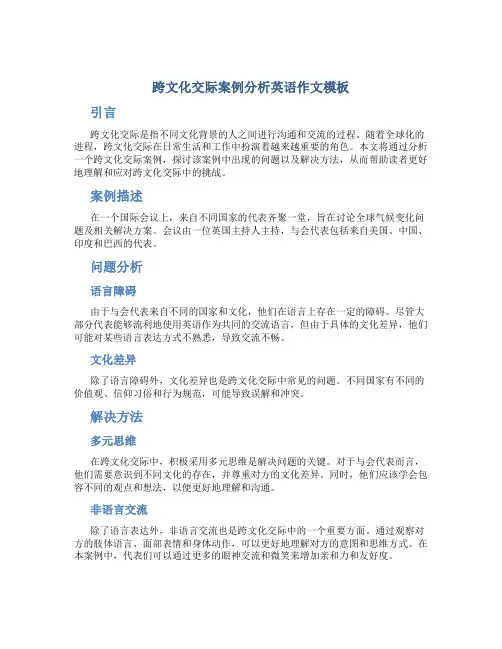
跨文化交际案例分析英语作文模板引言跨文化交际是指不同文化背景的人之间进行沟通和交流的过程。
随着全球化的进程,跨文化交际在日常生活和工作中扮演着越来越重要的角色。
本文将通过分析一个跨文化交际案例,探讨该案例中出现的问题以及解决方法,从而帮助读者更好地理解和应对跨文化交际中的挑战。
案例描述在一个国际会议上,来自不同国家的代表齐聚一堂,旨在讨论全球气候变化问题及相关解决方案。
会议由一位英国主持人主持,与会代表包括来自美国、中国、印度和巴西的代表。
问题分析语言障碍由于与会代表来自不同的国家和文化,他们在语言上存在一定的障碍。
尽管大部分代表能够流利地使用英语作为共同的交流语言,但由于具体的文化差异,他们可能对某些语言表达方式不熟悉,导致交流不畅。
文化差异除了语言障碍外,文化差异也是跨文化交际中常见的问题。
不同国家有不同的价值观、信仰习俗和行为规范,可能导致误解和冲突。
解决方法多元思维在跨文化交际中,积极采用多元思维是解决问题的关键。
对于与会代表而言,他们需要意识到不同文化的存在,并尊重对方的文化差异。
同时,他们应该学会包容不同的观点和想法,以便更好地理解和沟通。
非语言交流除了语言表达外,非语言交流也是跨文化交际中的一个重要方面。
通过观察对方的肢体语言、面部表情和身体动作,可以更好地理解对方的意图和思维方式。
在本案例中,代表们可以通过更多的眼神交流和微笑来增加亲和力和友好度。
文化培训为了更好地解决跨文化交际中的问题,代表们可以参加文化培训课程。
这样的培训可以帮助他们了解不同国家的文化差异,学习如何在不同文化背景下进行有效的沟通和合作。
结论跨文化交际对于全球化时代的人们来说越来越重要。
在面对语言障碍和文化差异时,采取多元思维、注重非语言交流和接受文化培训等解决方法是非常必要的。
通过正确应用这些方法,我们可以在跨文化交际中更加顺畅地沟通和合作,推动全球各国的发展和合作。
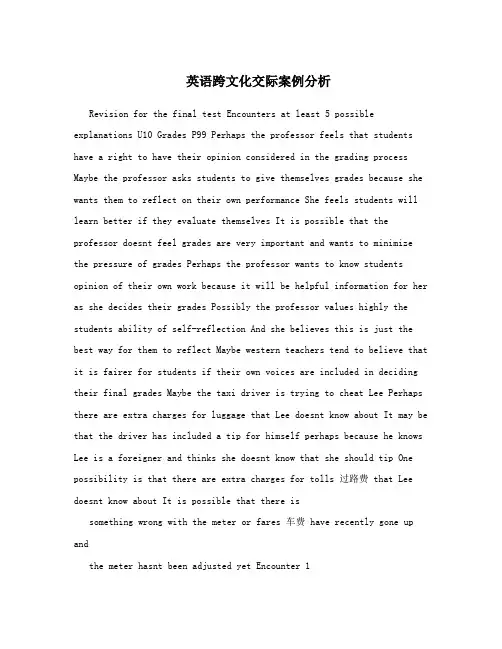
英语跨文化交际案例分析Revision for the final test Encounters at least 5 possible explanations U10 Grades P99 Perhaps the professor feels that students have a right to have their opinion considered in the grading process Maybe the professor asks students to give themselves grades because she wants them to reflect on their own performance She feels students will learn better if they evaluate themselves It is possible that the professor doesnt feel grades are very important and wants to minimize the pressure of grades Perhaps the professor wants to know students opinion of their own work because it will be helpful information for her as she decides their grades Possibly the professor values highly the students ability of self-reflection And she believes this is just the best way for them to reflect Maybe western teachers tend to believe that it is fairer for students if their own voices are included in deciding their final grades Maybe the taxi driver is trying to cheat Lee Perhaps there are extra charges for luggage that Lee doesnt know about It may be that the driver has included a tip for himself perhaps because he knows Lee is a foreigner and thinks she doesnt know that she should tip One possibility is that there are extra charges for tolls 过路费 that Lee doesnt know about It is possible that there issomething wrong with the meter or fares 车费 have recently gone up andthe meter hasnt been adjusted yet Encounter 1U1 The Taxi P1 6 Maybe the driver has included a tip for himself –anunreasonably large one 7 Possibly the driver has included agenerous –but not entirely unseasonal –tip for himself perhaps because he knowsshe is a foreigner and thinks she doesnt know that she should tip or cause in the past other foreigners have given him very stingy tips Ms Kelsen may feel that teachers should not accept gifts especially valuable ones from students In the West it is rare for individual students to give teachers gifts especially expensive ones Maybe Ms Kelsen does not think it right to accept a gift especially a valuable one just for doing her duty as a teacher Perhaps Ms Kelsen is afraidthat other people will find out that she accepted the gift and they will think she took a bribeEncounter 2U2 The gift P13 Ms Kelsen may feel that she only did her duty so she has done nothing to deserve such a special gift Ms Kelsen may feel uncomfortable because she assumes Frank cannot afford to give expensive gifts Ms Kelsen may feel that accepting the gift would put her under obligation to Frank Most Westerners feel that accepting a valuable gift entails a degree of reciprocity 酬答 Maybe the teacher really isnt very interested in helping Hal and his friends She was just being polite in offering to help them Perhaps the teacher is willing to help some butafraid that she will end up doing most of the work in running the club so she is trying to minimize expectations It is likely that the teacher already teaches English all day and doesnt want to do any more Encounter3U7 The English club P68 4 Maybe the teacher would really like tohelp but simply doesnt have enough time for the club time demands 5 The teacher may not be too busy now but she is reluctant to make a major time commitment before she knows how much free time she will have in her new life time demands 6 The teacher may think the club will be better if students run it themselves teacherstudent perspective differences 7 Perhaps the teacher really isnt very interested in helping Hal and his friends She thinks that in helping her they were only doing their duty so she doesnt own them anything public and private official and personal 8 Maybe the teacher is interested in helping but she believes it is good for students to get the habit of creating their own practice opportunities rather than waiting for the teacher to tell them what to do Case study从中西文化角度分析 1 Telephone courtesyKathy and David a couple from the US signed a one-year contract to work in China both were extroverted and soon made some Chinese friends Before long people started calling them at home David was sometimes away on business trips for a few days and if someone looked for him Kathyoften would find the conversation awkward Where did he go the caller typicallywould ask Can I pass on any message Kathy asked politely trying to avoid the question Is he out of town the caller was usually very persistent Yes can I help you in any way Kathy tried to be polite but she could not help feeling uncomfortable Chinese perspective In China when someone calls a person who is not home where is heshe or where did heshe go are natural questions By asking them the caller may not necessarily be interested in finding out exactly where the person is Usually the questions are asked simply as a way to carry on the phone conversation before hanging up It is typical Chinese telephone courtesy American perspective In America information about ones daily actions should be private and not generally shared with just others Questions about where someone went or if heshe is out of town are private and hence asking them is seen as rude If the caller had to speak with David before a certain date or time that person could say so by stating something like Yes Id like to leave a message and could indicate the date before which heshe needs to talk with David 2Criticizing a teacherShortly after Raymond started teaching English in an Englishtraining center in China the director told him in a round-about way that thestudents were unhappy about some of his method and had made some suggestions about his teaching Raymond felt very embarrassed not justbecause the students had some concerns about his teaching style but because they had complained directly to the director Chinese perspective In china preserving good relationships and harmony between people is generally considered very important so people generally try to avoid telling a person directly that heshe did something wrong When it is a must to tell it is usually done through a third party In this case the students thought they would upset the teacher if talking to him directly and in person To avoid face-to-face embarrassment it is good to keeptheir relationship by turning to the director their boss as the mediator about the issue American perspective Americans like to maintain a harmonious working environment too However the way they do so isdifferent from that in china In America students would normally expect and be expected to speak directly with the teacher If students go to a teachers supervisor their action would be seen as a state that the teacher is not respected or trusted by the students and that they haveto go above his heard to bring down the power of his boss on him In this case actually Raymond must have felt terribly hurt If the student come directly to Raymond he could haveresponded directly to their suggestions and thus avoided the embarrassment of being criticized by his superior 3 its a compliment Lu was invited to a Christmas party organized by graduate students Most of the people there were Americans After a few drinks Lu noticedthat people became more relaxed The things they said to each other andtheir body language soon turned very flirting 风骚的 Men and women would leanagainst each other in the couch almost like boyfriends andgirlfriendsOne male graduate student sat behind Lu She could felt that his hands were playing with her long hairs She turned around and wanted to stop him but before she said anything he said you look very seductive tonight Lu felt terrible do I Im sorry I dont mean to seduce you The student laughed Why are you feeling sorry Youre very attractive Its a compliment Lu wasconfused She did not know how to respond Chinese perspectiveFlirting is associated with having a low moral standard It is seenas wrong and would usually arouse disgust And flirting with another person would be the basis for a fight between spouses or a boy and girl friendAmerican perspectiveTo westerners flirting is not necessarily seen as a serious expression of interest in another person It is usually something done just for fun It makes both persons feel attractive and special Even married people may flirt with someone elses spouse Between stranger the flirting may justtake the form of discrete分散的 looks and smiles perhaps somelight-hearted words Friends might be a bit bolder in their words and might touch each other casually on the arm or hand 4 Identity Girl-nessAs a visiting professor in an American university Chunghwa wasinvited to give a lecture to a group of American students he talked about university students in China During the question-and –answer periodafter the lecture one female student asked a question that surprised Chunghwa when you talked about female students you referred to them as girls Why Because they are girls thats what they are called Chunghwa tried to answer but he knew he did not really understand the intend to the question I dont quite understand your question Im afraid In the States we call ourselves women if were old enough to go to theuniversity calling us girls is insulting Chinese perspective In china girl means someone who is young and single In a way it makes a female sound more desirable to be called a girl rather than a woman For most people woman means someone who is married and who probably is not young In fact most single Chinese females such as university students would be insulted to be called women American perspective What to call females is a sensitive and sometimes confusing issue in the west In formal public settings it is customary to call any woman who is past puberty [pjubt] 青春期 a woman even though she may not be legally old enough to vote marrypurchase alcoholic beverages drive a car or sign a contract This terminology became widespread during the womens liberation movement in the 1960s The term girl is sometimes interpreted to be demeaning or disrespectful。
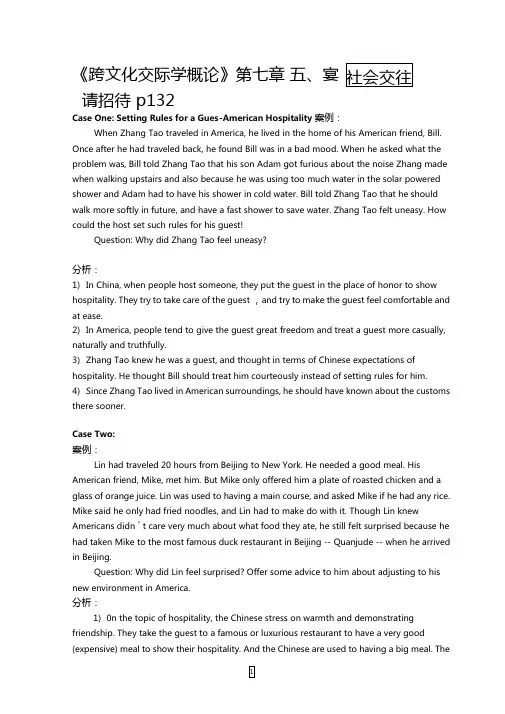
《跨文化交际学概论》第七章五、宴社会交往请招待 p132Case One: Setting Rules for a Gues-American Hospitality 案例:When Zhang Tao traveled in America, he lived in the home of his American friend, Bill. Once after he had traveled back, he found Bill was in a bad mood. When he asked what the problem was, Bill told Zhang Tao that his son Adam got furious about the noise Zhang made when walking upstairs and also because he was using too much water in the solar powered shower and Adam had to have his shower in cold water. Bill told Zhang Tao that he should walk more softly in future, and have a fast shower to save water. Zhang Tao felt uneasy. How could the host set such rules for his guest!Question: Why did Zhang Tao feel uneasy?分析:1)In China, when people host someone, they put the guest in the place of honor to show hospitality. They try to take care of the guest ,and try to make the guest feel comfortable and at ease.2)In America, people tend to give the guest great freedom and treat a guest more casually, naturally and truthfully.3)Zhang Tao knew he was a guest, and thought in terms of Chinese expectations of hospitality. He thought Bill should treat him courteously instead of setting rules for him.4)Since Zhang Tao lived in American surroundings, he should have known about the customs there sooner.Case Two:案例:Lin had traveled 20 hours from Beijing to New York. He needed a good meal. His American friend, Mike, met him. But Mike only offered him a plate of roasted chicken and a glass of orange juice. Lin was used to having a main course, and asked Mike if he had any rice. Mike said he only had fried noodles, and Lin had to make do with it. Though Lin knew Americans didn ' t care very much about what food they ate, he still felt surprised because he had taken Mike to the most famous duck restaurant in Beijing -- Quanjude -- when he arrived in Beijing.Question: Why did Lin feel surprised? Offer some advice to him about adjusting to his new environment in America.分析:1)0n the topic of hospitality, the Chinese stress on warmth and demonstrating friendship. They take the guest to a famous or luxurious restaurant to have a very good (expensive) meal to show their hospitality. And the Chinese are used to having a big meal. Themore dishes they put out,the greater the warmth and friendship they show.2)In western countries, people stress on freedom. They give the guest great freedom to choose their own foods. And westerners tend to have only one main course and some juice or desser,t which is viewed as casual in the eyes of the Chinese.3)Lin lived in American surroundings and should have adjusted himself quickly to the new world (lifestyle). He should have known the custom there first, and felt more at ease in Mike om'es. hCase Three: Equality or Hospitality for Table Manners 案例:Lin Hua has accompanied an American delegation to visit China. They have experienced the hospitality of the Chinese people. After returning to America, Linhua once visited them. They were so glad to meet again. Linhua offered to host the meal, but they refused. They ordered their own dish, and Linhua ordered her own. When footing the bill, they only paid their part,and no one wanted to pay for Linhua. Linhua found them so inhospitable, though she knew the Americans would usually pay for their own food.Question: Why did Linhua find them inhospitable? 分析:1)In China, to show hospitality, people tend to host the meal. And if they cannot do this, they at least will struggle to pay for the guest.2)In America, people tend to pay for themselves to show equality and independence.3)Linhua knows this custom, but from a Chinese point of view, she still finds this hard to accept, and feels it a little inhospitable.Case Four: 案例:I have an American friend. I have invited him several times, and at long last he invited me to his home one day. He told me to get there at 3 p m. I thought we could chat and have a meal together. I gave him a Chinese calendara, woman'sscarf and a bottle of Chinese white wine. He only took out a dish of nuts, a plate of bread and a bottle of wine. After two hours ' chaIt,found there was no hint of a meal and said good-bye to him. He only gave me a box of chocolate as a present for the New Year. After I got home, I found the box already been opened. I was very surprised, Question: What surprised me?分析:1)In China, a visit to home always includes a meal. And the guest always brings a relatively expensive present to the host. And the present should be well wrapped or untouched.2)In the west, a visit to home only means a meeting, not necessarily including a meal. And the present is treated not as importantly as it is in China.3)I acted in a way that was based on Chinese customs, so I felt the American way was very interesting (unusual).Case Five: Way of Entertaining Guests in China ------- Drink more and more案例:Tom, an American, went to a Chinese home for the first time. He was offered some tea. Just when the first cup was about to finish, more tea was added. He drank the second cup. Then the cup was filled the third time. Then he drank it, then ? until he was quite full. Tom was totally confused by the way of entertaining.Question: Why was Tom totally confused?分析:1)Traditional Chinese custom requires that during the course of entertaining, the host has to always pour more wine or tea to the gues'st glass or cup, and always adds more food to the guest' s plate or bowl without asking whether it ' s wanted.2)Chinese guests know how to respond to this type of hospitality. They simply leave the wine, tea, or food in the container and stop having any more. But Tom, the American guest in the case didn ' t know this.3)He followed the politeness rule of his culture: it 's not good manners to leave food in one's own plate at a dinner table. Therefore, without any knowledge of the differences between the two cultures, an American guest would very likely suffer from either drinking or eating too much in such a situation.Case SixAs a foreign student at the University of Wisconsin in Madison, Keiko Ihara (Japanese)was on a strict budget. She had all her tuition and books paid for by scholarships and grants and until recently was comfortably housed in the dormitory. Wanting to live in the community rather than in the dormitory, she found a small apartment to share with a friend. Her college friends, knowing of her situation, offered to round up some of the necessary items for apartment living. Keiko politely declined, saying she could manage. Wanting to help out her friends found some old but still usable household appliances and furniture. Mary had an old desk that was in hergarage. Ed had some chairs from his uncle, and Joe and Marion had a few extra dishes. They cheerfully brought them over one day. Keiko seemed very embarrassed,but gracefully accepted them, sincerely and profusely thanked them.The following week they were each presented with a gift from Keiko. Mary got an ornate jewelry box, Ed a volume of woodcuts by a famous Japanese artist, and Joe and Marion a beautiful Japanesevase, all of which were of considerable worth and value, much more than the old things they had donated to her. They all protested that she could not afford to give such elaborate gifts; they really expected nothing as the household items were not really being used and they would rather have her use them. Keiko, however, insisted that they take the gifts. In the end, they accepted the gifts, although they all felt uncomfortable as they knew she was really sacrificing to give them.Questions:1.What do you think of Keiko insisting on giving valuable gifts to her college friends?2.Why did Keiko ' s friends feel very uncomfortable when they received valuable gifts in return?分析:Keiko insists on giving valuable gifts to her college friends, because in countries like Japan, exchanging gifts is a strongly rooted social tradition. Should you receive a gift, and don't have one to offer in return, you will probably create a crisis. If not as serious as a crisis, one who doesn't offer a gift in return may be considered rude or impolite. Therefore, in Japan, gifts are a symbolic way to show appreciation, respect, gratitude and further relationship.Keiko obviously has taken those used items from Mary, Ed and Marion as gifts, for she probably doesn't know that Americans frequently donate their used household items to church or to the community. Mary, Ed and Marion would never consider those used household items given to Keiko as gifts. No wonder they felt very uncomfortable when they received valuable gifts in return.Case SevenSelma, who is from the US, is in a student exchange program in Indonesia. One day, she was asked to attend a birthday party and she was delighted, for she was curious to know what an Indonesian birthday party was like. To her surprise, she was the only one that dressed in typically Western clothes. Although she had no strong reason to become uneasy, her uneasy feeling prevailed as the party was going on. To make herself feel better, she went to the food table and began to help herself. But, upon leaving the table, she tripped on the leg of a chair and spilled her drink on the floor. One of the girls stooped down to mop up the spill and everyone else laughed out loud. Selma, uncertain what to do next, quietly moved out of her way with her head lowered in shame.Questions:3.What functions does laughing serve in similar situations in China?4.What should we do to help ourselves or other people out of embarrassment caused by culturaldifferences in laughing?分析:Just like smile, laughing does not always serve the same function in different cultures. Interestingly, for us Chinese, laughing often has a special function on some tense social occasions. People may laugh to release the tension or embarrassment, to express their concern about you, their intention to put you atease or to help you come out of the embarrassment. In this case, the people there were actually wishing to laugh with the American rather than laugh at her. Their laughing seemed to convey a number of messages: don ‘t take it so seriously; laugh it off, it things‘ s nothing; such can happen to any of us, etc. Unfortunately the American was unaware of this. She thought they were laughing at her, which made her feel more badly and angry, for in her culture laughing on such an occasion would be interpreted as an insulting response, humiliating and negative.。

Case analysisSituation:Suppose you were Mr.Li, CEO of Rising Sun Incoparated, facing CTO, Mr. Robinson’s resignation, and the fevered laid-off employees because of the downsizing plan, please write down a speech to present to the employees or to Mr. Robinson in solving the problem (you can choose to write a speech either to Mr. Robinson or to employee in 500 words.)According to the situation we’ve got, I chose to write a short speech to persuade the fevered laid-off employees. And before the speech, I ‘d like to show you the train of my thought which I think is important, I will persuade the employees using these methods as following:I. Persuading oneself before othersIn business communication, before persuading others, one should in the first place persuade himself. Intrapersonal communication is a process of knowing oneself, improving oneself and surpassing oneself. Others people cannot read our minds, we are the ones that must translate the things we think so that the others can understand us. So we need to take movements to think about ourselves, about your wishes and desires. Until we persuaded ourselves, we can persuade others.II. Setting personal objectiveSetting personal objectives is the core of professional success. It can help us know what we have to do now and it also can save our time. When we definitely know what we will do and what our expectation is, we can persuade others follow this way we think. But sometimes there are obviously other considerations which must be woven into the objective specification. If we can not fulling committed at this stage, we are unlikely to achieve our objective.III. Applying the power of personalityKnowing others different personality are very important for the leaders. Also we need to know our personality well. Everyone is different. There is no such thing as a right or a wrong personality. People just think and act differently in different influencing situations. If you learn more about others personality and weaknesses, you can use it in a right way to make a success in communication.IV. Say the right things in a right way (Choosing the right approach )Depend on what outcome you want, how much commitment you seek, you will choose the style most suitable and follow it through. But remember that, no matter what kind of approach you chose, you must make sure it is the best choice. It’s must fit for the situation. Saying the right things , but what are the right things, I recommended these as following:a. Boss should rehearse what they will say, and even bring notes into the meeting,so they won’t say the wrong things or forget something important,b. Refrain from talking about other employees’ situations, which could raise questions of fairness.c. Realize that they may not take in everything you say at such a tough time, so give theemployee time to react.d. It’s good to show sympathy and regret for the situation, but don’t pretend you know how they feel.V. Help the laid-off employees move onThe employer can soften employees’ pain over the job loss by helping them find their next job, especially now with the economy so bad. Present a list of possible resources for the terminated employee,such as job-placement experts or contacts at other companies hiring in your industry. Also you can give them a good reference and perhaps even reach out to acquaintance who you think may be hiring.VI. Allow for transitionIt’s also important to consider timing. The employer should allowing the laid-off employees a short time to find a new job. Don’t need to call the security escort newly laid-off employees immediately to the door. Give their some time for transition and do something you can do to coach them, help them find a new position.VII. Non-verbal skills in the communicationAs for me, I think this part is the very important. Because it is reliable and efficient. When we communicate nonverbally, we sometime do so unconsciously. We don’t mean to do this, but those acts come naturally. If we can read other people’s non-verbal messages correctly, we can interpret their underlying attitudes and intentions and respond appropriately.We need to know how to read those non-verbal messages and how to speak this language. It’s the most important e this, we can easily understand other people and express our thoughts more explicitly.Dear teacher:On my personal level, I believe those are useful in this case and I try to write my speech in those aspects. I’m not sure whether it will make sense or not, but those I think are some important points. Although there are still many intellectual points in the book, I just think they are not fit for this case. So I have picked out few of them, some points I’ve just put them on , but I didn’t write them into my speech, such as Non-verbal skills. Because I didn’t know how to combine it with the case. I’m sure this speech can not be the perfect one, I’m trying to make it more reasonable and more persuasion. If there are anything wrong in my speech ,please point it out and let me know, so I won’t make the same mistake next time. Thank you, teacher.Bibliography:周仕宝. 2011. 商务沟通技能Business Communication Fundamentals 北京:北京大学出版社叶兴国,谢文怡. 2010. 商务英语阅读教程1学生用书Business English:A Reading Course Students book 上海:上海外语教育出版社Speech:I know why you come here. I must say I’m really sorry about this decision, but I have no choice, I must do it. You didn’t know how long I spent in persuading myself before I told you this. Actually, it’s a bad news, I also didn’t want to make this decision. I believe that each of you are excellent employee, I do remembered the contributions that you have done for our company, and I know you devoted yourself to this company, you take the company as your children. To laid you off it’s also difficult for me.But you all know the business this year is not very good, we can no longer employ all of you, the financial circumstances that caused the need for layoffs. Frankly speaking, it’s not an easy decision but this was a way that needed to be made. You need to know it’s not your fault--it’s my fault--although I’ve tried to avoid the layoffs as much as I could. I know it’s hard to accept immediately , I give you time to process what’s happening and to ask your questions what you want to ask.You may think it’s your performance made your have been laid off, I have to say it’s not that case. You are doing a good job, I really appreciated what you did. According to personalities , I know you all dominant and introvert person, you listen to others opinions carefully, focus on every details thoroughly. You always be thoughtful and deliberate with what you are doing. I was satisfied with your performance and your qualification. I didn’t want to fired you but I have to listen to the board , I couldn’t decided whether you leave or not. I didn’t have the authority to do so. I tried my best to persuade them but I was failed. However, don’t doubt about your ability. No matter where you are and what job you will do in the future, I believe you can do it well. Believe yourself, what cause you have been laid-off it’s not your fault, it’s my fault.I’m really sorry to tell you that. Actually I’m regret for this situation, but I can’t pretend that I know your feeling, I’m not you. The fact is, I really know it must be a hard time for you to go through but all I can do now is try my best to help you.If you have any problems, please don’t think to much, come to me for help.If you don’t mind, I would like to give you some advice. There is a list of possible resources for you. They are all solid performers and I can help you to offer them a good recommendation, tell them your good performance here. The last parts is depend on you. Today is Tuesday, you can immediately do something about your job situation, contact a career counselor and ask for advice, it can help you to find a prospective employer.Maybe time is too short for you to settle down all the things. I will announce your departure to the colleagues few weeks later, but in the return ,I will ask you to sign a contract with some ground rules,such as you promising you won’t steal competitive information. Do you agree with it? If you really need time, I can allow you to stay on for up to a couple of months during you finding your new job. It’s the last thing I can do for you. I’m sorry. But I wish you can find a better job. Good luck.。
Unit 1Communication Across CulturesCase 1 (Page 23)This case took place in 3 cultures. There seemed to be problems in communicatingwith people of different cultures in spite of the efforts to achieve understnading.1)In Egypt as in many cultures, the human relationship is valued so highly that it is not expressed in an objective and impersonal way. While Americans certainly value human relationships, they are more likely to speak of them in less personal, more objective terms. In this case, Richard’s mistake might be that he choseto praise the food itself rather than the total evening, for which the food was simply the setting or excuse. For his host or hostess it was as if he had attended an art exhibit and compliment ed the artist by saying, “What beautiful frames your pictures are in!”2)In Japan the situation may be more complicated. Japanese people value order and harmony among a group, and that the group is valued more than any particular member. In contrast, Americans stress individuality and are apt to assert individual differences when they seem justifiably to be in conflict with the goals or values of the group. In this case, Richard’s mistake was making great efforts to defend himself even if the error is notintentiona. A simple apology and acceptance of the blame would have been appropriate3) When it comes to England, w expect fewer problems between Americans and Englishmen than between Americans and almost any other group. In this case we might look beyond the gesture of taking sugar or cream to the valuess expressed in this gesture: for Americans, “Help yourself”; for the English counterpart, “Be my guest.” American and English people equally enjoy entertaining and being entertained, but they differ in the value of the distinction. Typically, the ideal guest at an American party is obe who “makeshimself at home”. For the English host, such guest behavior is presumptuous or rude.Case 2 (Page 24)A common cultural misunderstanding in classes involvs conflicts between what is said to be direct communication style and indirect communication style. In American culture, people tend to say what is on their minds and mean what they say. Therefore, students in class are expected to ask questions when they need clarification. Mexican culture shares this preference of style with American culture in some situations, and that’s why the students from Mexico readily adopted the techniques of asking questions in class.However, Korean people generally prefer indirect communication style, and therefore they tend not to say what is on their minds and to rely more on implications and inference, so as to be polite and repectful and avoid losing face through any improper verbal behavior. As is mentioned in the case, to many Koreans, numerous questions would show a disrespect for the teacher, and would also reflect that the student has not studied hard enough.Case 3 (Page 24)The conflict here is a difference in cultural values and beliefs. In the beginning, Mary didn’t realize that her Dominican sister saw her as a member of the family, literally. In the Dominican view, family possessions are shared by everyone of the family. Luz was acting as mostDominican sisters woould do in borrowing without asking every time. Once Mary understood that there was a different way of looking at this, she would become more accepting. However, she might still experience frustration when this happened again. She had to find ways to cope with her own emotional cultural reaction as well as her practical problem (the batteries running out).Case 4 (Page 25)It might be simply a question of different rhythms. Americans have one rhythm in their personal and family relations, in their friendliness and their charities. People from other cultures have different rhythms. The American rhythm is fast. It is characterized by a rapid acceptance of others. However, it is seldom that Americans engage themselves entirely in a friendship. Their friendship are warm, but casual and specialized. For example, you have a neighbor who drops by in the morning for coffee. You see her frequently, but you never invite her for dinner------not because you don’t think she could handle a fork and a knife, but because you have seen her that morning.Therefore, you reserve your more formal invitation to dinner for someone who lives in a more distant part of the city and whom you would not see unless you extended an invitation for a special occasion. Now, if the first friend moves away and the second one moves nearby, you are likely to reserve this------see the second friend in the mornings for informal coffee meetings, and invite the first one more formally to dinner.Americans are, in other words, guided very often by their own convenience. They tend to make friends rapidly, and the y don’t feel like it necessary to go to a great amount of trouble to see friends often when it becomes inconvenient to do so, and usually no one is hurt. But in similar circumstances, people from many other cultures would be hurt very deeply.Unit 2Culture and CommunicationThe analysis of this case: (Page 38)The least three things among the following Tom did that were regarded to be impolite:b. Tom opens the gift as soon as he is presented with it.d. Tom does not make a second offer of drinks when they refuse the first.e. Tom talks about the cost of living in the U.S.A.f. Tom does not ask them to stay longer when they say they must be leaving.g. Tom does not go out to see them off.Case 5 (Page 60)Analysis: The Chinese guide should refuse the first offer because he is obeying the Chinese rules for communication. We Chinese are modest, polite and well-behaved. Maybe the guide is waiting for a second or third offer of beer, but he doesn’t know the reasons behind the rule in American culture that you do not push alcoholic beverages on anyone. A person may not drink for religious reasons, he may be a reformed alcoholic, or he may be allergic. Whatever the reason, you donot insist on offering alcohol. So they politely never made a second offer of beer to the guide.Case 6 (Page 61)When a speaker says something to a hearer,there are at least three kinds of meanings involved:utterance meaning, the speaker’s meaning and the hearer’s meaning. In the dialogue, when Litz asked how long her mother-in-law was going to stay, she meant that if she knew how long she was going to saty in Finland, she would be able to make proper arrangements for her, such as taking her out to some sightseeing. However, her mother-in-law took Litz’s question to mean “Litz does not want me to saty for long”. From the Chinese point of view, it seems inappropriate for Litz to ask such a question just two days after her mother-in-law’s arrival. If she has to ask the question, it would be better to ask some time later and she should not let her mother-in-law hear it.Case 7 (Page 62)Analysis:Keiko insists on giving valuable gifts to her college friends, because in countries like Japan, exchanging gifts is a strongly rooted social tradition. Should you receive a gift, and don’t have one to offer in return, you will probably create a crisis. If not as serious as a crisis, one who doesn’t offer a gift in return may be considered rude or impolite. Therefore, in Japan, gifts are a symbolic way to show the care, respect, gratitude and further friendship. Keiko’s college friends would rather round up some of the necessary items and they are willing to have her use them. They really expected nothing from her. For in America, people donate their used household items to church or to the community. They would never consider these old items as gifts to Keiko. So Keiko’s valuable gifts have made her American friends feel uncomfortableCase 8 (Page 62)When the Chinese girl Amy fell in love with an American boy at that time, it seems that she preferred to celebrate Chritmas in the American way, for she wanted very much to appear the same as other American girls. She did not like to see her boyfriend disappointed at the “shabby” Chinese Christmas. That’s why she cried when she found out her parents had invited the minister’s family over for the Christmas Eve dinner. She thought the menu for the Chritmas meal created by her mother a strange one because there were no roast turkey and sweet potatoes but only Chinese food. How could she notice then the food chosen by her mother were all her favorites?From this case, we can find a lot of differences between the Chinese and Western cultures in what is appropriate food for a banquet, what are good table manners, and how one should behave to be hospi table. However, one should never feel shame just because one’s culture is different from others’. As Amy’s mother told her, you must be proud to be different, and your only shame is to have shame.Unit 3Cultural DiversityCase 7 (Page 76)Between friends there is inevitably a kind of equality of give-and-take. But in different cultures, people view this differently. In Chinese culture,friendships develop slowly because they are built to last. We Chinese prefer the saying “A friend indeed is a friend in need.” And we never refuse theasking for help from a friend. We never forget the timely help by a friendwhen we are on the rocks. But In American culture, they view this in adifferent way. Once helped, they offer their help only once. That’s whyJackson said that Mr. Zhao was asking too much. In their view, friendshipsare based on common interests.1 Different Lands, Different Friendships (P 77)●French Friendships●German Friendships●English Friendships●Chinese Friendships (见补充材料)●American Friendships (见补充材料)补充案例(American Friendship)Two mothers, Carmen and Judy, are talking to each other at a park while their children are playing together in the sand.Caemen: Hi, Judy.Judy: Hi, Carmen. How are you?Carmen: Fine. I’m glad to see that our children like to play together.Judy: Yeah, me too. I remember just a month ago they weren’tsharing their toys.Carmen: Now it looks like they’re enjoying each other.Judy: Finally! Maybe we could get together at each other’s ho usessometime. I’m sure the kids would enjoy that.Carmen: Sure. That’d be nice.Judy: Well, let’s do it soon.Carmen: O.K.(Judy and Carmen continue to talk while their children play.) Case AnalysisJudy and Carme n are not real friends. They don’t want to get together, really. They once met each other a month ago. Americans sometimes make general invitation like “Let’s get together sometimes.” Often this is just a way to be friendly. It is not always a real invit ation. If they’d like to set a specific (exact) time, that means a real offer.2 Family Structure (P83)●Chinese Family●Filipinos Family●Vietnamese Family●Japanese Family (See Case 9 and Case 10)●Latin American FamilyCase 9 (Page 96)Traditional Japanese respect their elders and feel a deep sense of duty toward them. The elders in traditional Japanese families are typically overpowered. So the grandfather seemed to be an absolute authority for the young chairman. In Japanese culture challenging or disagreeing with eilder’s opinions would be deemed as being disrespectful. That is why the young chairman said nothing but just nodded and agreed with his grandfather. And it results in the Japanesecompany’s withdrawal from the negotiations concerning a relationship with Phil’s company a week later.Case 10 (Page 97)In Japan, a company is very much like a big family, in which the manager will take care of the employees and the employees are expected to cevote themselves to the development of the company and, if it is necessary, to sacrifice their own interests for the interests of the company. But to the French, a company is just a loosely-knit social organization wherein individuals are supposed to take care of themselves and their families. And the family is the number one priority, which is unlike the Japanese model “not involving females and the right to decide by dominant male”.Case 11 (Page 97)In most cultures, an apology is needed when an offence or violation of social norms has taken place. To many Westerners, Japanese apologize more frequently and an apology in Japanese does not necessarily mean that the person is acknowledging a fault. To many Japanese, Westeners may seem to be rude just because they do not apologize as often as the Japanese would do. In this case, the atitude of the Australian student’s parents is shocking the Japanese but will be acceptable in an English-speaking society, for the student is already an adult and can be responsible for her own deeds.Case 12 (Page 98)In this case, it seems that the Chinese expectation were not fulfilled. First, having two people sharing host responsibilities could be confusing to the Chinese.Second, in China, it is a tradition for the host to offer a welcome toast at the beginning of the meal. By not doing so, the Canadian might be thought rude. The abrupt departure of the Chinese from the banquet was probably an indication that they were not pleased with the way they were treated. The Canadians’ lack of understanding of the C hinese culture would be a problem in their dealing with the visiting delegation.。
跨文化交际英语案例分析万能模板引言跨文化交际是指不同文化背景下的人们进行交流和互动的过程。
在全球化的背景下,跨文化交际成为了一个重要的话题。
而英语作为全球通用语言,跨文化交际英语的学习和应用也变得越来越重要。
本文将以案例分析的方式,介绍一个跨文化交际英语案例分析万能模板,以帮助读者更好地理解和应用跨文化交际英语知识。
案例背景在全球化的进程中,企业间的国际合作和交流越来越频繁。
然而,由于文化差异的存在,跨国企业在进行合作时,往往会遇到跨文化交际的困扰。
本案例将以一个跨国企业的合作案例为例,分析其中出现的跨文化交际问题,并提供解决方案。
案例分析案例描述某跨国公司A与国内企业B达成了一项合作协议,双方将共同开发新产品。
公司A来自美国,公司B来自中国,双方员工需要进行频繁的沟通和协调工作。
然而,在合作开始的初期,双方员工之间出现了一些交际障碍,导致工作效率低下。
分析问题1.语言障碍:双方员工的母语不同,使用英语进行交流时存在一定的困难。
2.文化差异:美国和中国的商务文化存在一定的差异,双方的沟通方式和合作习惯也不尽相同。
3.沟通风格:美国员工通常采用直接、直接的沟通方式,而中国员工更喜欢间接、委婉的方式,这导致了沟通上的不顺畅。
解决方案针对以上问题,可以采取以下解决方案:1.语言培训:公司A可以为公司B的员工提供英语培训课程,帮助他们提高英语水平,增强英语交流能力。
2.文化研究:双方员工可以学习对方国家的商务文化知识,了解彼此的沟通方式和合作习惯,从而增进彼此的了解和信任。
3.沟通训练:利用角色扮演等方式,让双方员工互相模拟对方的沟通风格,以增强彼此的沟通技巧和适应能力。
结论跨文化交际英语在全球化时代具有重要的意义。
通过学习和应用跨文化交际英语知识,可以帮助我们更好地处理在跨文化交际中所遇到的各种问题。
本文介绍了一个跨文化交际英语案例分析万能模板,希望可以为读者提供一种思路和方法,以便更好地应对跨文化交际中的挑战。
Cases 33-36Case 33The prblem that Li Li has encountered during her stay in the United States are typical of those that people may face when they enter a new culture.Obviously Li Li has gone through distinct stages in the process her adaptation to the American cultural environment: honeymoon period (Letter 1), when she was fascinated and excited by almost everything in the United States and felt elated to be in the new culture; culture shock (Letter 2), when she was flooded with many problems that she had not been prepared for and became extremely homesick; initial adjustment (Letter 3), when she learned more about American culture and cultural adaptation and began to feel much better; mental isolation (Letter 4), when she felt frustrated and became even hostile towards Americans; and acceptance period (Letter 5), when she began to tralize the positive and negative aspects of the country and have a more balanced perspective about her experiences there.What she means by “I think I have finally arrived in America” in her fifth letter is that she has finally learnedto accep the culture different from her own and begun to integret herself into it. She is no longer like a fish out of water, and does not feel alienated from the new environment any more.Case 34In this case, it seems that Kevin failed to understand that customs for such a social gathering would be culturally different and Blanca was not properly prepared for experiencing a culture shock like this when she came to work and live in a new cultural environment.In Dominican culture, it is usually considered inappropriate for a young unmarried female to go to a social gathering without anyone else accompanying her. A chaperone is often required, and getting one’s parents’permission is also necessary. However, all this may be very strange to North Americans nowadays. Kevin could not quite understand why Blanca, already an adult supposed to be independent, had to bring her little sister along to the gathering so as to get her parents’permission.Another thing on which they differ is the way they pay checks. In Dominican culture, somewhat like Chinese culture, peoplegoing out to eat together seldom pay separately. The elder ones would pay for the younger ones, and the male would pay for the female. Having expected that Kevin would pay for their meals, Blanca didn’t bring much money with her. Therefore, when Kevin said “separate checks, please” to the waiter, just as North American people usually do, he didn’t realize that he had put Blanca in a very embarassing situation. That’s why Blanca whispered to her sister and just ordered something to drink.Case 35The American’s personal experience in Russia has taught us not to jump to a conclusion about any other culture. We may misinterpret the behavior and intention of people in other cultures, for we are easily influenced by some popular overgeneralizations about other cultures. We have to be aware that things in other cultures may not be what they appear to us foreigners. One of the difficulties we will experience in adjusting to a new culture is that we may have taken too much of our own “cultural baggage”: misleading stereotypes and preconceptions about members of that culture. In intercultural communication it is sometimes true that a little learning about other cultures can be a dangerous thing. Distorted or biasedknowledge may be worse than no knowledge at all. Even if what we know about other cultures has been proved to be right and well grounded, we still have to remember that there is often variation within any culture. We should always be prepared for exceptions when interacting with individuals from another culture.Case 36We all know that we are members of a particular culture and we share the same cultural identity with other members of the culture. However, much of our cultural identity may simply be outside of our awareness. Not until we find ourselves in situation where our sense of self------our values, beliefs, practices------is called into question do we perceive the tacit dimensions of our cultural identity. In this incident, the German woman has found out that Americans treat their neighbors in a way that is different from the way Germans do. As her expectations were thwarted, she became aware of her own cultural identity, her cultural way of thinking, of interpreting the world. This could be a painful process, which many of us, as the German woman in this case, may not be prepared for. Therefore, it is important to raise people’s awarenessof their culturally shaped identity and acknowledge the likelihood of some emotional disturbance during the cultural adjustment.。